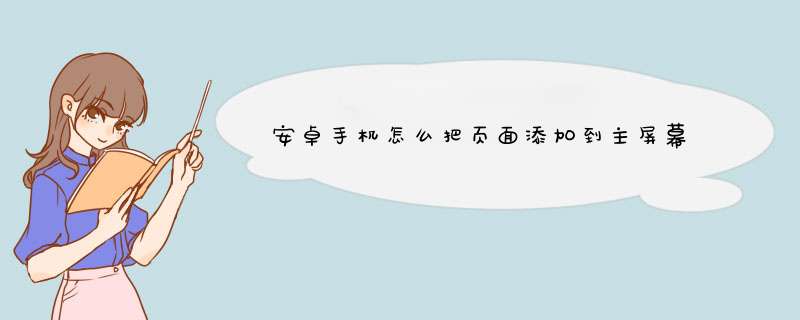
传统方式如下:
从Android 7.1(API 25)开始,新增了ShortcutManager,可以对桌面久按应用图标d出的快捷方式进行管理。
但是,Android 7.1上直接往桌面上添加快捷方式依然是使用上面说到的这种旧方式,但是Android O上,Google应该是想通过比较统一的接口来管理桌面快捷方式了,所以摒弃了这种形式,转而使用ShortcutManager进行管理。所以API 26上,ShortcutManager进行管理。所以API 26上,ShortcutManager新增了对Pinned Shortcuts(固定快捷方式)的管理。
官文:
Apps can pin an existing shortcut (either static or dynamic) or an entirely new shortcut to a supported launcher programatically using requestPinShortcut(ShortcutInfo, IntentSender). You pass two arguments into this method:
A ShortcutInfo object – If the shortcut already exists, this object should contain only the shortcut’s ID. Otherwise, the new ShortcutInfo object must contain an ID, an intent, and a short label for the new shortcut.
A PendingIntent object – This intent represents the callback that your app receives if the shortcut is successfully pinned to the device’s launcher.
Note: If the user doesn’t allow the shortcut to be pinned to the launcher, the pinning process fails, and the Intent object that is passed into this PendingIntent object isn’t executed.
Note: Due to background execution limits introduced in Android O, it’s best to use a manifest-declared receiver to receive a callback.
Also, to prevent other apps from invoking the receiver, add the attribute assignment android:exported=”false” to the receiver’s manifest entry.
Note: As you add logic in your app to make requests to pin shortcuts, keep in mind that not all launchers support pinning of shortcuts. To determine whether your app can complete this process on a particular device, check the return value of isRequestPinShortcutSupported(). Based on this return value, you might decide to hide the option in your app that allows users to pin a shortcut.
Note: See also the support library APIs isRequestPinShortcutSupported(Context) and requestPinShortcut(Context, ShortcutInfoCompat, IntentSender), which works on Android versions lower than O by falling back to the deprecated private intent com.android.launcher.action.INSTALL_SHORTCUT.
译:
应用程序可以使用requestPinShortcut(ShortcutInfo,IntentSender)将现有的快捷方式(静态或动态)或全新的快捷方式固定到支持的启动器。你通过这个方法的两个参数:
ShortcutInfo对象 - 如果快捷方式已存在,则该对象应仅包含快捷方式的ID。否则,新的ShortcutInfo对象必须包含新快捷方式的ID,意图和短标签。
PendingIntent对象 - 此意图表示如果快捷方式成功固定到设备的启动器,您的应用程序将收到回调。
注意:如果用户不允许将快捷方式固定在启动器上,则固定进程将失败,并且未执行传入此PendingIntent对象的Intent对象。
注意:由于Android O中引入的后台执行限制,最好使用清单声明的接收器来接收回调。
另外,为了防止其他应用程序调用接收器,将属性赋值android:exported =“false”添加到接收者的清单条目中。
注意:当您在应用程序中添加逻辑以引导快捷方式时,请记住,并非所有启动器都支持固定快捷方式。 要确定您的应用程序是否可以在特定设备上完成此过程,请检查isRequestPinShortcutSupported()的返回值。 根据此返回值,您可以决定隐藏您应用程序中允许用户固定快捷方式的选项。
注意:另请参见支持库API isRequestPinShortcutSupported(Context)和requestPinShortcut(Context,ShortcutInfoCompat,IntentSender),它可以在低于O的Android版本上运行,因为它们回落到不推荐使用的私有意图com.android.launcher.action.INSTALL_SHORTCUT。
ShortcutManager类在API level 26上,增加了对isRequestPinShortcutSupported、requestPinShortcut、createShortcutResultIntent三个方法。说明如下:
1.isRequestPinShortcutSupported
官文:
Return TRUE if the app is running on a device whose default launcher supports requestPinShortcut(ShortcutInfo, IntentSender).
The return value may change in subsequent calls if the user changes the default launcher app.
Note: See also the support library counterpart isRequestPinShortcutSupported(Context), which supports Android versions lower than O using the legacy private intent com.android.launcher.action.INSTALL_SHORTCUT.
译:
如果默认桌面支持requestPinShortcut(ShortcutInfo,IntentSender)方法,则返回TRUE。
如果用户更改默认启动程序应用程序,返回值可能会在后续调用中更改。
注意:另请参见支持库对应的isRequestPinShortcutSupported(Context),在低于O的Android版本,它支持使用旧的私有意图com.android.launcher.action.INSTALL_SHORTCUT。
2.requestPinShortcut
官文:
Request to create a pinned shortcut. The default launcher will receive this request and ask the user for approval. If the user approves it, the shortcut will be created, and resultIntent will be sent. If a request is denied by the user, however, no response will be sent to the caller.
Only apps with a foreground activity or a foreground service can call this method. Otherwise, it’ll throw IllegalStateException.
It’s up to the launcher to decide how to handle previous pending requests when the same package calls this API multiple times in a row. One possible strategy is to ignore any previous requests.
Note: See also the support library counterpart requestPinShortcut(Context, ShortcutInfoCompat, IntentSender), which supports Android versions lower than O using the legacy private intent com.android.launcher.action.INSTALL_SHORTCUT.
译:
请求创建固定的快捷方式。默认启动器将收到该请求,并要求用户批准。如果用户批准,将创建快捷方式,并且将发送resultIntent。但是,如果请求被用户拒绝,则不会向呼叫者发送任何响应。
只有具有前台活动或前台服务的应用程序才能调用此方法。否则,它将抛出IllegalStateException。
当同一个软件包连续多次调用该API时,由开发人员决定如何处理以前的待处理请求。一个可能的策略是忽略任何先前的请求。
注意:另请参见支持库对应件requestPinShortcut(Context,ShortcutInfoCompat,IntentSender),在低于O的Android版本,它支持使用旧的私有意图com.android.launcher.action.INSTALL_SHORTCUT。
3.createShortcutResultIntent
官文:
Returns an Intent which can be used by the default launcher to pin a shortcut containing the given ShortcutInfo. This method should be used by an Activity to set a result in response to ACTION_CREATE_SHORTCUT.
译:
返回默认启动器可以使用的Intent来固定包含给定的ShortcutInfo的快捷方式。 Activity应该使用此方法来设置响应ACTION_CREATE_SHORTCUT的结果。
根据d窗提示可以看出,可以通过拖动这个图标往桌面上添加快捷方式,可以通过点击自动添加按键,系统给你在桌面的默认位置上添加。
添加后,桌面上会出现如图所示的图标:
回调用到的Receiver:
打印log发现,onReceive如图官方文档所说,点击d框自动添加按键后,会得到回调。但实践发现,如果桌面上已经添加了图标,当再次调用requestPinShortcut进行添加时,onReceive会在调用requestPinShortcut的时候,直接被回调,而且d框也会d出来。
在以上三个方法官方介绍中,官方提示我们,可以使用Android support库的ShortcutManagerCompat进行快捷方式的版本适配。于是,在build.gradle中添加依赖进行尝试:
通过浏览器菜单,添加“桌面书签”功能来实现。具体 *** 作如下。
1)打开华为浏览器,登陆手机新浪网。
2)网页最底下有一个设置菜单,如红色框框。
3)d出下图相关设置,点击“收藏网址”菜单。
4)d出编辑数钱菜单。选择“桌面书签”复选框后,选择右上角的勾勾标识(如图红色框框)
5)d出“添加到主屏幕”提示框,点击“添加”
6)此时网页快捷方式已成功添加到桌面(如下图)
欢迎分享,转载请注明来源:内存溢出

 微信扫一扫
微信扫一扫
 支付宝扫一扫
支付宝扫一扫
评论列表(0条)